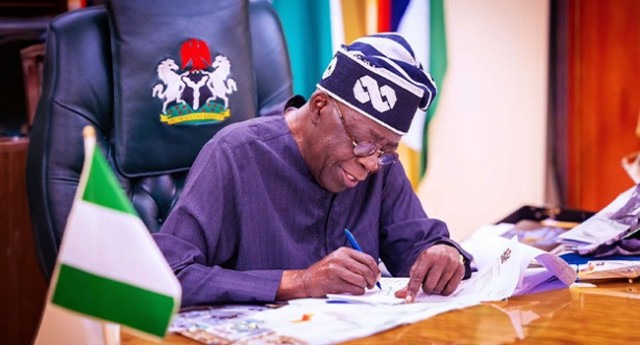Former federal lawmakers from northern Nigeria are sharply divided over President Bola Tinubu’s potential bid for a second term in 2027.
The division follows an endorsement by the Northern Caucus Forum of the 9th National Assembly, which has triggered a wave of opposition from other ex-legislators within the region.
At a dialogue session convened in Kaduna by the Chief of Staff to the President, Femi Gbajabiamila, the Northern Caucus Forum publicly declared support for Tinubu's re-election bid.
In a communiqué issued after the meeting, the forum described the President as a national leader who has demonstrated commitment to equitable development across Nigeria.
Gbajabiamila, who previously served as Speaker of the House of Representatives, urged members of the forum to back Tinubu’s administration and his bid for a second term.
He noted that the President’s leadership has brought notable infrastructure and policy reforms that have benefited all regions, including the North.
“President Tinubu is a national figure who has ensured no region is left behind. From infrastructure to policy, the North has not been sidelined,” he said.
The communiqué, signed by the Forum’s Coordinator, Rufai Chanchangi, a former member of the 8th House of Representatives, highlighted the need for political continuity and fairness in the country’s power rotation system.
“We believe it is in the best interest of the North and Nigeria for the South to complete its turn in leadership. Therefore, we endorse President Tinubu’s continuation in office beyond 2027,” the statement read.
Chairman of the National Forum of Former Legislators, Nnanna Igbokwe, also commended the endorsement, describing it as an act of patriotism and a signal of leadership that prioritizes national unity over regional interest.
However, the endorsement has drawn backlash from a separate group of northern former lawmakers who rejected the position of the caucus. Operating under the name Concerned Former Members of the House of Representatives, Northern Nigeria, the group criticized the meeting and its outcome as politically driven and unrepresentative.
In a statement titled "We Can’t All Be Commodified", and signed by Zakari Mohammed, Aminu Shagari, Tom Zakari, and Mohammed Musa Soba, the group condemned the endorsement, describing it as a "staged political show" lacking legitimacy.
Speaking on behalf of the group, Mohammed stated that the caucus led by Chanchangi did not represent the collective voice of all former lawmakers from the North. “This group does not speak for all former northern legislators.
The communiqué is neither representative nor reflective of sentiments across northern Nigeria,” the statement read.
The group went further to accuse the forum of being a political front for the Chief of Staff, suggesting that the endorsement was motivated by a desire for political patronage.
They also cited the worsening socio-economic conditions in the region under the current administration.
“The reality in the North is one of deepening poverty, insecurity, and economic hardship. Millions of families continue to suffer as the administration fails to address these urgent issues,” the group asserted.
They highlighted persistent violence and insecurity in northern states like Zamfara, Kaduna, Katsina, Borno, and Benue, accusing the government of neglect and ineffective governance.
The statement also took issue with the leadership of Rufai Chanchangi, distancing the group from him and labeling his actions as self-serving.
“We disassociate ourselves from Chanchangi and his group. They do not possess the moral or constitutional authority to speak for former legislators of the North,” they said.
The group described the endorsement as “a desperate effort to sanitize the failings of the administration,” while the larger population in the region continues to suffer.
“The North deserves bold and honest leadership, not orchestrated declarations masking hunger and insecurity,” the statement concluded.
The internal rift among northern ex-lawmakers comes just days after a gathering of northern leaders in Kaduna to assess the Tinubu administration’s performance two years into his term.
The event, held at the Arewa House, brought together stakeholders from the 19 northern states and the Federal Capital Territory. Opinions were divided—while some praised the President’s achievements, others expressed deep dissatisfaction with perceived marginalization and economic neglect.
The dialogue in Kaduna is believed to be part of broader efforts by the Presidency to manage northern discontent and consolidate support ahead of the 2027 elections.
Meanwhile, prominent northern political figures, including former governors Rabiu Kwankwaso and Sule Lamido, have publicly criticized Tinubu’s administration, accusing it of favoring the South. Kwankwaso recently alleged that the North had been sidelined, an accusation swiftly denied by the Presidency.




















